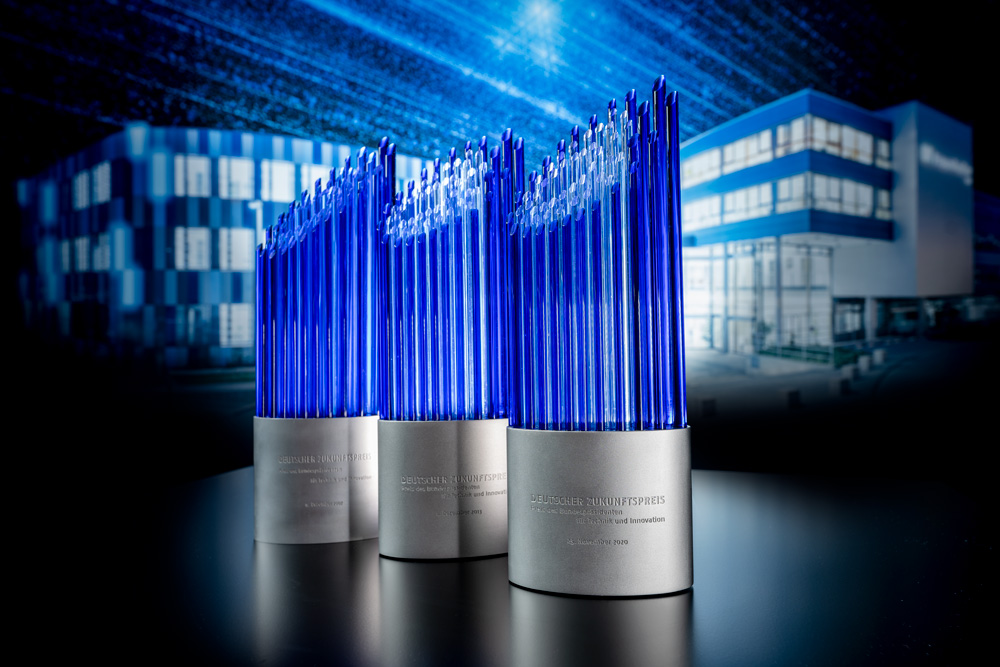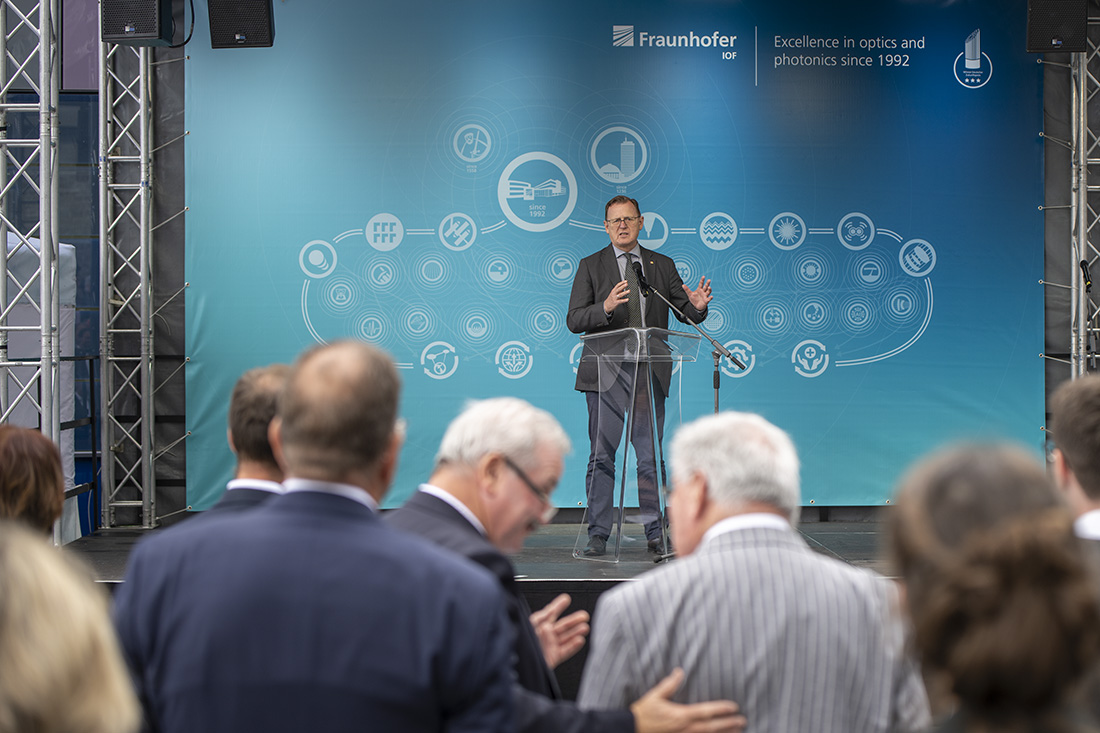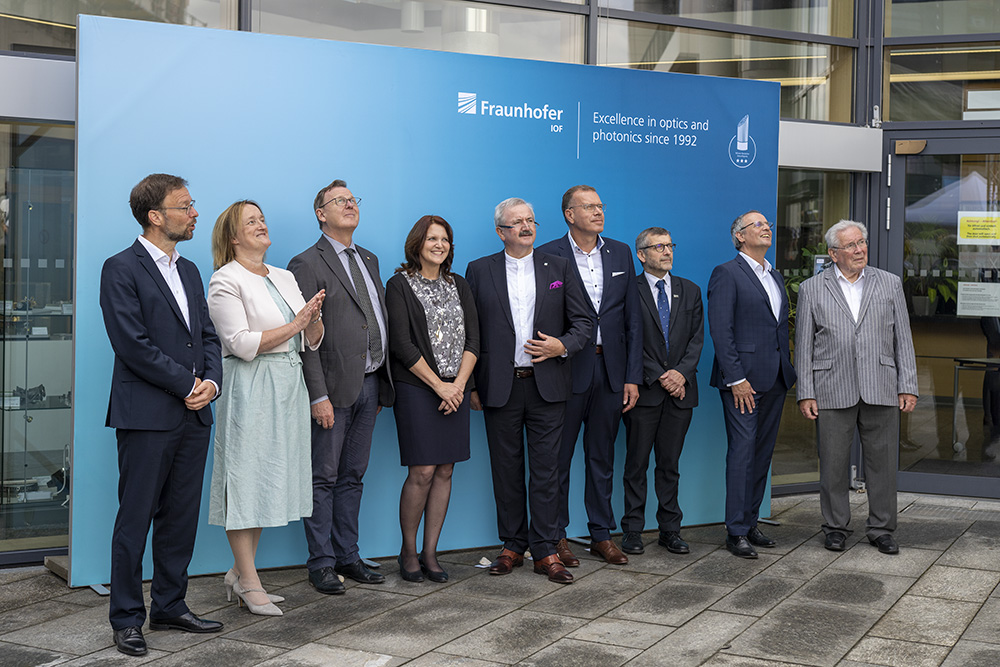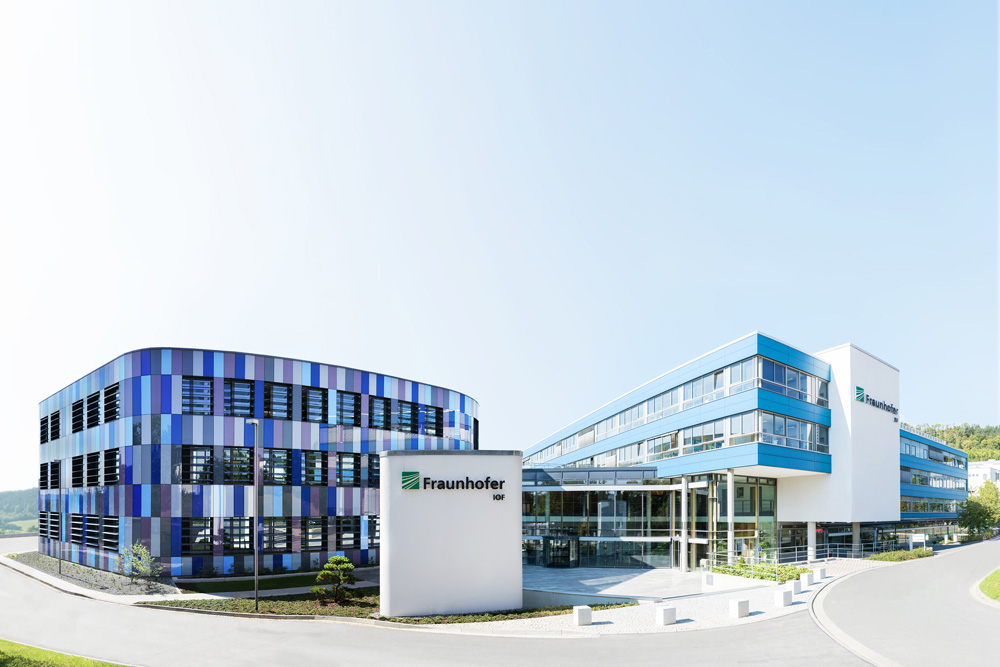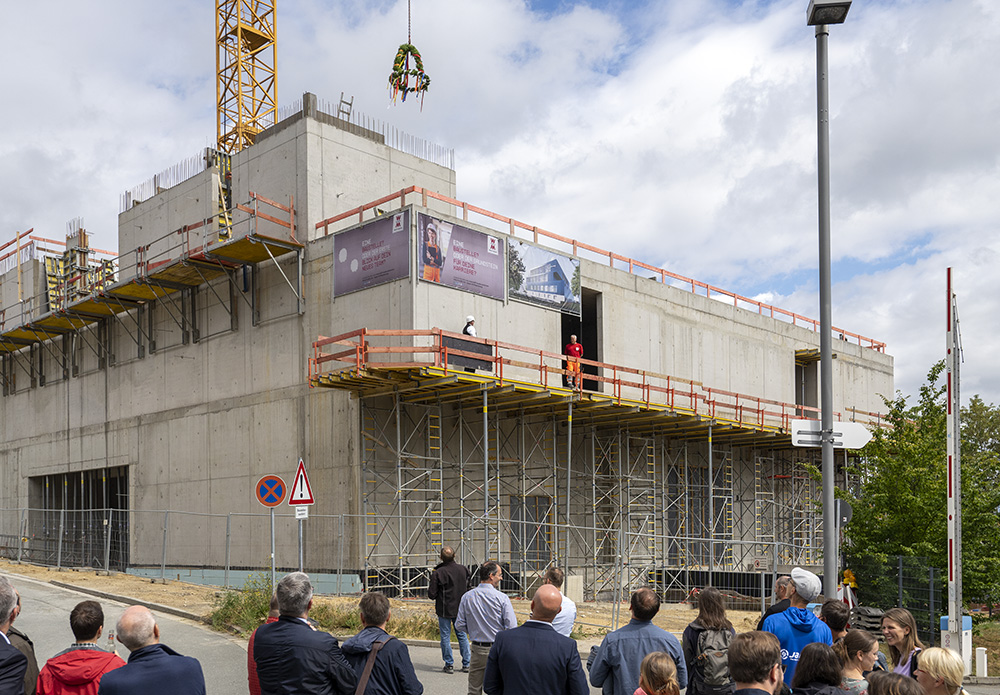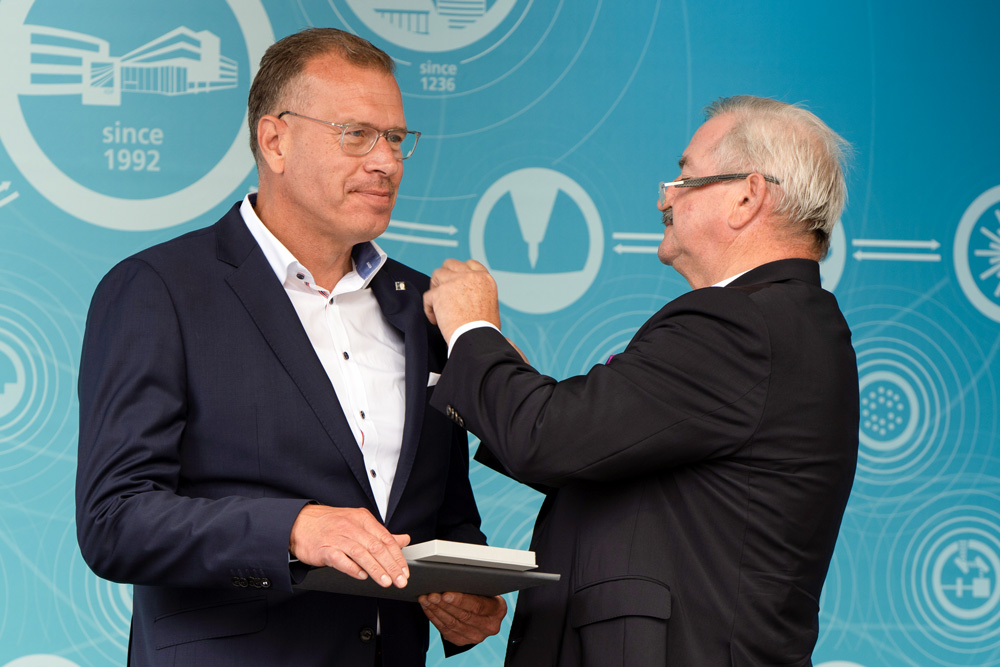Institute celebrates three decades of optics and photonics research and topping-out ceremony for new research building
Fraunhofer IOF celebrates 30th anniversary
30 years ago, the Fraunhofer Institute for Applied Optics and Precision Engineering IOF was founded in Jena. The institute celebrated three decades of optics and photonics research with an anniversary celebration on July 7. Among the guests were representatives of state and federal politics as well as the Fraunhofer Executive Board. They also celebrated the topping-out ceremony for the institute's newest research building. In the future, especially quantum research will be advanced here.
Fraunhofer IOF is a true kid of the colorful 90’s: With a gigantic enthusiasm for the topic of light and all the associated colors of the spectrum, the institute was founded in 1992 at the traditional optics location of Jena. Since then, the researchers have repeatedly contributed to pushing the boundaries of what is technically feasible and to developing new innovative solutions with light for relevant future issues in the fields of society, economy, and industry.
Three times winner of German Future Prize for innovative future
technologies
“The development of high-intensity LED lamps, which are now found as universal light sources in almost every household, is just one of the technological highlights from three decades of pioneering research,” recalls Prof. Dr. Andreas Tünnermann, director of the institute.
- In 2006, LED lamps even garnered the German Future Prize awarded by the German Federal President.
Afterwards, the award for innovative technologies went to Jena two more times:
- in 2013 for the development of ultra-short pulse lasers for industrial applications and
- in 2020 for EUV lithography, which enables the production of even smaller and more powerful microchips than ever before.
The institute celebrated these and many other successes at an anniversary party on July 7 together with its employees and guests. "For 30 years now, the Fraunhofer IOF has been researching innovative optical systems for the central future and Fraunhofer Strategic Research Fields of Quantum Technologies, Intelligent Medicine as well as Resource Efficiency and Climate Technologies," emphasized Prof. Dr. Reimund Neugebauer, President of the Fraunhofer-Gesellschaft, in his welcoming address at the ceremony. "In particular, quantum technologies, which are becoming increasingly important in the institute's portfolio, make a decisive contribution to securing Germany's and Europe's technological sovereignty and future competitiveness through their disruptive potential, including in imaging and communications security."
With regard to the importance of photonics specifically for the Free State of Thuringia, Thuringia's Minister President Bodo Ramelow added: “Thuringia and photonics embody a success story of which we can be proud. More than 16,000 skilled workers, more than 180 companies and numerous research institutions in the field of optics and photonics are key witnesses of this impressive 30-year development. Fraunhofer IOF has thus also made a decisive contribution to making Thuringia attractive for the establishment of further future technologies.”
Dr. Katja Böhler, State Secretary for Research, Innovation and Economic Development in the Thuringian Ministry of Science, also expects strong impetus for the Free State in the future: “Fraunhofer IOF makes a fundamental contribution to research into future quantum technologies.” He stated that the state was a leader in the field of quantum communications.
Thuringia has been investing strategically in the development and expansion of this expertise for several years. Including ongoing projects, the state alone will provide around 35 million euros in funding for quantum research by the end of 2024. Most recently, the Ministry of Science supported the acquisition of a lithography system for the manufacturing of high-performance optics at Fraunhofer IOF with 12 million euros. The new system will be used in the new research building. In addition, there are currently ongoing federal projects worth ca. 120 million euros - such as the QuNET research initiative - some of which are also coordinated and implemented at Fraunhofer IOF.
420 employees and 17 spin-offs
To this day, the research institute has experienced steady growth. In its founding year, the institute started out with less than 60 employees. Today, there are about 420 employees who are passionate about making light a versatile tool. Many of them also have an international background. In addition, 17 start-ups have so far spun off from the institute and successfully established themselves on the market as independent companies.
“In order to develop new ideas, there needs to be a culture of freedom – a culture that questions the past and seeks new challenges,” commented director of the institute Andreas Tünnermann. “This culture characterizes our institute and the way our employees work. We want to understand what our partners in science and industry expect from us and what solutions they need from us – maybe even in the future to come. That's exactly where our work starts.”
Topping-out ceremony for new research building
New and groundbreaking questions for the future are to be expected especially in the field of quantum technologies. That is why the institute is currently expanding with a new research building. On an area of more than 2,000 m2, new laboratories and offices will soon be available to the institute to provide new space especially for quantum research.
500 guests therefore celebrated the topping-out ceremony of the third extension building of Fraunhofer IOF together with the 30th anniversary. "I am firmly convinced that Fraunhofer and the Jena Institute will succeed in further strengthening innovative strength in the key technologies of optics and photonics and setting new standards with even more space for new ideas," commented President Prof. Neugebauer at the ceremony.
After its foundation in 1992, the institute was initially located in Jena's city center, in the so-called “Eule” (English: Owl). For capacity reasons, it moved to a new building on the Beutenberg Campus in 2002. In 2011, the first extension building was added there. In 2017, the fiber technology center with a fiber drawing tower, which is directly integrated into the building complex, was opened. Completion of the latest research building is planned for 2023.
Fraunhofer Medal of Honor for Institute Director Prof. Andreas Tünnermann
After two years in which only a few events could take place at the institute due to the pandemic, the guests at the birthday celebration met with all the more joy at seeing each other again. President Prof. Neugebauer had a special surprise in store: He awarded the surprised institute director Prof. Tünnermann the Medal of Honor of the Fraunhofer-Gesellschaft. The president and the society thus honored the special services of the Jena researcher, which are expressed in the steady growth of the institute as well as the implementation of various major projects as an innovation driver in relevant future technologies.
Prof. Dr. Ina Schieferdecker, Ministerial Director at the Federal Ministry of Education and Research, and Jena's Lord Mayor Dr. Thomas Nitzsche also took part in the celebrations marking the anniversary and topping-out ceremony. Other guests included Prof. Dr. Walter Rosenthal, President of the Friedrich Schiller University of Jena, and Dr. Christian Schmitz, CEO of TRUMPF Lasertechnik GmbH, a key industrial partner of the Fraunhofer IOF in various projects.
